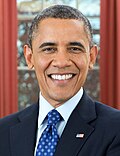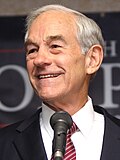Top Qs
Timeline
Chat
Perspective
2012 United States presidential election in Minnesota
From Wikipedia, the free encyclopedia
Remove ads
The 2012 United States presidential election in Minnesota took place on November 6, 2012, as part of the 2012 United States presidential election in which all 50 states plus the District of Columbia participated. State voters chose ten electors to represent them in the Electoral College via a popular vote pitting incumbent DFL President Barack Obama and his running mate, Vice President Joe Biden, against Republican challenger and former Massachusetts Governor Mitt Romney and his running mate, Congressman Paul Ryan.
Minnesota backed Obama for re-election, giving him 52.65% of the vote, while Republican challenger Mitt Romney took 44.96%, a victory margin of 7.69%. With ten Democratic wins in a row, Minnesota has the longest current streak of voting for the Democratic candidate in presidential elections of any state, having not voted Republican since Richard Nixon in 1972. This is the longest streak for the Democrats in history amongst non-Southern states.[2]
However, Romney was able to significantly improve on McCain's performance in Minnesota, as he did nationally. Fourteen counties that voted for Obama in 2008 flipped and voted for the Republican Party in 2012, while many Democratic counties had a margin of victory much narrower than in 2008. Big Stone County voted Republican for the first time since 1980, and Pine County since 1972. Obama thus became the first Democrat to win the White House without carrying Big Stone County since Grover Cleveland in 1892.[3] Obama also became the first ever Democrat to win the White House without carrying Red Lake County, as well as the first to do so without carrying Lincoln, Marshall, Pennington, or Polk Counties since Woodrow Wilson in 1912, the first to do so without carrying Grant or Pine Counties since Woodrow Wilson in 1916.
As of the 2024 presidential election, this is the last time the Democratic candidate won the following counties: Beltrami, Chippewa, Fillmore, Freeborn, Houston, Itasca, Kittson, Koochiching, Lac qui Parle, Mahnomen, Mower, Norman, Rice, Swift, and Traverse, or won a majority of congressional districts in the state.
Remove ads
Caucuses
Summarize
Perspective
Democratic caucuses
Republican caucuses
The Republican caucuses were held on February 7, 2012.[5] The events coincided with the Colorado Republican caucuses as well as the Missouri Republican primary. Minnesota has a total of 40 delegates, 37 of which are tied to the caucuses while 3 are unpledged RNC delegates. The non-binding straw poll was won by Rick Santorum, but Ron Paul won 32 of the 40 delegates to the Republican National Convention.
Conventions
There is no formal system of allocating delegates to candidates in any step of the election process. At each meeting the participants decides what the best course of action is. The state convention can vote to bind the 13 at-large delegates to a candidate. The 24 delegates elected at the CD conventions and the 3 automatic (RNC) delegates are not legally bound to vote for a candidate.
- 17 February - 31 March: BPOU conventions elect delegates to the state convention and the congressional district conventions.
- 14–21 April: Eight congressional conventions elect 3 National Convention delegates each.
- 18–19 May: State convention elect 13 National Convention delegates.[11]
Remove ads
General election
Summarize
Perspective
Predictions
Results
By county
- Counties that flipped from Democratic to Republican
- Aitkin (largest city: Aitkin)
- Big Stone (largest city: Ortonville)
- Grant (largest city: Elbow Lake)
- Lincoln (largest city: Tyler)
- Marshall (largest city: Warren)
- Murray (largest city: Slayton)
- Pennington (largest city: Thief River Falls)
- Pine (largest city: Pine City)
- Polk (largest city: East Grand Forks)
- Pope (largest city: Glenwood)
- Red Lake (largest city: Red Lake Falls)
- Stevens (largest city: Morris)
- Watonwan (largest city: St. James)
- Yellow Medicine (largest city: Granite Falls)
By congressional district
Obama won six of eight congressional districts, including two held by Republicans. Romney won two, including one held by a Democrat.[20]
Remove ads
See also
References
External links
Wikiwand - on
Seamless Wikipedia browsing. On steroids.
Remove ads













